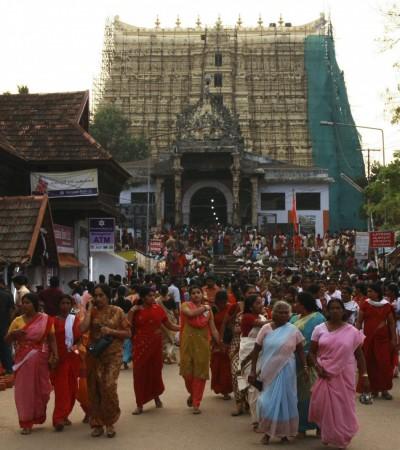
India's Supreme Court will deliver its final verdict on the last unopened Vault B Friday following an expert panel's recommendation that it should be opened.
The panel submitted its interim report to the country's highest court Thursday, saying that the treasure in the famous Padmanabha Swamy temple should be opened to ascertain its value.
In July, court-appointed officials unearthed treasure worth more than $23 billion from secret underground chambers in the centuries-old Sree Padmanabhaswamy temple in Thiruvananthapuram, capital of the South Indian state of Kerala. The last remaining vault was not yet opened pending the court's verdict.
The expert panel headed by Dr. C.V. Ananda Bose from the National Museum included representatives of the Reserve Bank of India and the Archaeological Survey of India. The court has asked the committee to prepare the inventory of the treasure and evidence in the form of both videos and photos.
Diamonds, gold jewellery and other valuables worth an estimated $23 billion have been found from the five of the six vaults so far. There were fears that the families of those who opened the vaults might face retribution, and the recent death of the main petitioner Sundar Rajan was cited.
The other five vaults were opened after almost 136 years in July, making the temple the richest in India. Previously, Tirumala Venkateswara Temple in Tirupati, Andhra Pradesh; Golden Temple in Amritsar, Punjab; and the Shirdi Sai Baba shrine in Maharashtra were believed to be the richest temples in the country.
The temple was constructed in the 18th century in the Dravidian style architecture, but references to earlier structures at the site date back to as early as the early medieval writings of the Alvars (sixth to ninth centuries).
The vaults were searched following Rajan's petition to the Supreme Court to order the government to take over the temple as it did not have adequate security and the current trust appointed by the erstwhile royal family was incapable of protecting the wealth of the temple.
Sree Padmanabhaswamy temple is a Hindu temple dedicated to Lord Vishnu, who is in the eternal sleep posture, and is considered one of the 108 Divya Desams (Holy Abodes) in India. Kerala, also known as God's Own Country, has now become the real abode of God's own treasury too.
Leaders of the Hindu community want the wealth to be invested in the temple, while many intellectuals, including former Supreme Court Justice V.R. Krishna Iyer, have suggested it should be used for the public good.
Hindus normally donate gold and other precious objects as gifts to spiritual or religious institutions that run hospitals, schools, colleges and temples. This has led to billions of dollars worth of wealth accumulating in several temples of India.
The Tirumala temple is reported to have 3,000 kilograms (6,614 pounds) of gold, a third of which it deposited with the State Bank of India last year, while spiritual guru Sathya Sai Baba, who died in April, left behind an estimated $9 billion estate.
($1 = 45 rupees)








